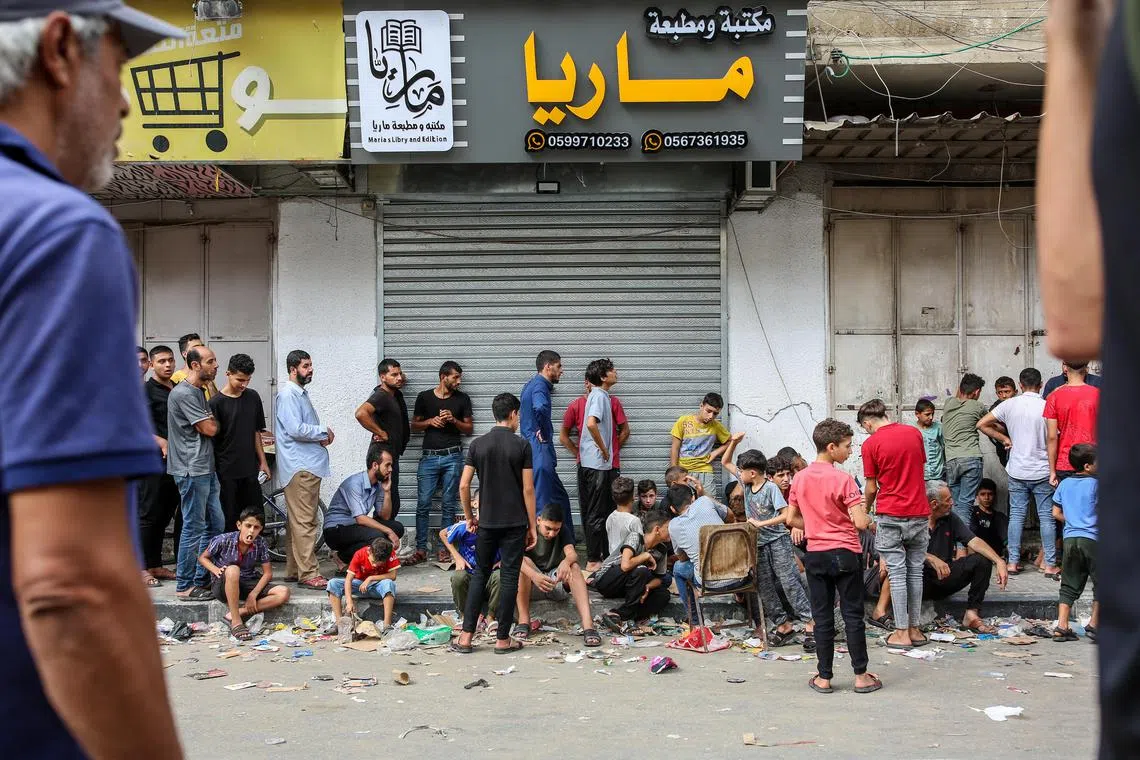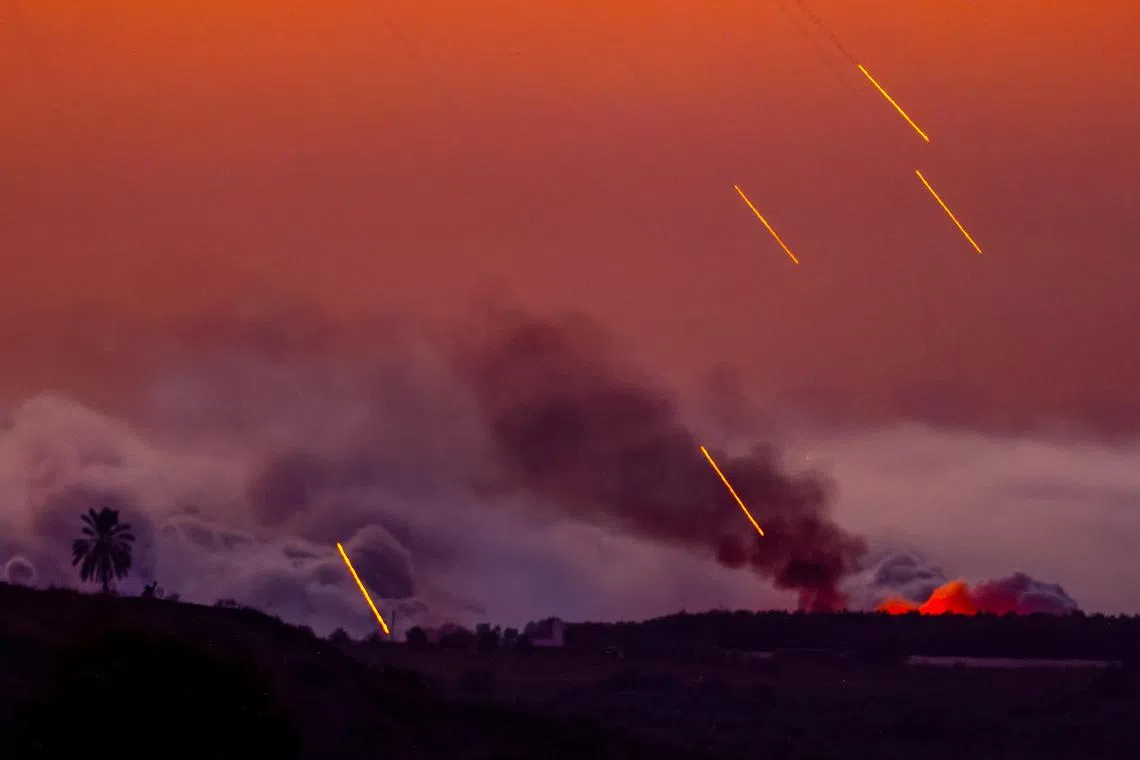34 hours of fear: The blackout that cut Gaza off from the world
Sign up now: Get ST's newsletters delivered to your inbox

People line up at a bakery in Khan Younis, southern Gaza Strip, on Friday.
PHOTO: NYTIMES
Follow topic:
GAZA - For 34 hours, the vast majority of the more than two million Palestinians who live in Gaza had no way to reach the outside world, or one another.
They had no way to know whether their loved ones were alive or dead. Emergency phone lines stopped ringing. Desperate paramedics tried to save people by driving towards the sound of explosions. Wounded people were left to die on the street.
On Friday at sunset, three weeks into Israel’s bombing campaign in Gaza – and as Palestinians braced themselves for an impending Israeli ground invasion – the weak phone and Internet service that had allowed some semblance of life to continue inside the blockaded enclave was suddenly severed.
Two US officials said the United States believed Israel was responsible for the communications loss, speaking on the condition of anonymity because of the sensitivity of the issue.
Panic rippled through the territory.
“I felt that I had become blind and deaf, unable to see or hear,” Mr Fathi Sabbah, a journalist based in Gaza, wrote on his Facebook profile on Sunday, after phone and internet service partly returned.
Since gunmen from Hamas – the armed group that rules Gaza – burst through the border fence on Oct 7, killing about 1,400 people in southern Israel
In response to the attacks, the Israeli military declared a siege of the densely populated territory, cutting off electricity, water and medical supplies as it rained down a relentless barrage of aerial and artillery bombardments.
On Sunday, the Israeli military said it had expanded a ground incursion overnight,
The Israeli military also said it was conducting air strikes in Lebanon after at least 16 rockets were launched from there into Israeli territory.
In Gaza, 47 aid trucks crossed the border from Egypt carrying water, food and medicine – the most in a single day since trucks were first allowed in on Oct 21. But this is still insufficient compared with the levels of assistance that aid organisations say are needed.
Mr Ahmed Yousef, a 45-year-old civil servant who lives in the town of Deir El Balah, thought the loss of electricity and water was as bad as things could get.
“But losing communications turned out to be far worse,” he said. Not only could he not contact his relatives and friends, but he was also unable to reach the man who sells water to him – or another man whom he pays to wait in line at a bakery for hours to buy bread for his family.
At first, he thought the service loss was temporary. He only learnt that there was a near-total blackout by using electricity from a solar panel system to watch Al Jazeera, an Arabic satellite television network – the single thread linking him to the outside world.
Connectivity restarted spontaneously around 4am on Sunday, said Mr Abdulmajeed Melhem, chief executive of Paltel Group, the main Palestinian telecommunications company. The company had made no repairs and had no understanding of how or why service had partly returned, he said.
He believed that the Israeli government was responsible for the cut and the restoration – although service remains limited after an Israeli air strike on a telecommunication tower early in the war.
Israeli officials have so far declined to comment on accusations that they deliberately caused the cuts. The two US officials said they urged their Israeli counterparts to do what they could to restore communications.
The blackout stirred terror – and fury – across the Gaza Strip.
“It seems that Palestinians were making too much noise while they were being butchered,” Dr Ghassan Abu-Sittah, a British Palestinian plastic surgeon who put his London practice on hold to volunteer in a Gaza hospital, wrote on the social media platform X, formerly known as Twitter. “It offended the refined sensibilities of Israel’s Western backers. So they cut off all communication and silenced us.”
Isolated from the outside world – and one another – Palestinians in Gaza faced scenes from an apocalyptic movie.
Rescue crews were forced to try to locate the sites of air strikes by observing the direction that explosions came from, said Mr Mahmoud Basl, a civil defence official. In other cases, volunteers picked up injured people and drove them to the hospital, notifying teams when they arrived of the location of the air strike, so they could try to save others left behind, he said.

Israeli shells strike the northern part of the Gaza Strip on Oct 29, 2023.
PHOTO: EPA-EFE
Mr Yusuf Al-Loh, director of operations for a medical services agency that falls under the Interior Ministry, described people who had run more than a mile to reach rescue teams, shouting for help. When some people finally reached them, they were so angry at feeling abandoned that they insulted the rescuers, deepening the sense of disaster “on a psychological level”.
Mr Al-Loh called the blackout a “war crime” for which people should be held accountable.
“F-16s are constantly flying to the point that I feel they want to erase Gaza,” he said.
More than 8,000 people have been killed in Gaza since the war began, including more than 3,000 children, said Mr Ashraf al-Qidra, a spokesman for the Gaza Health Ministry.
After communications returned, ambulance and civil defence crews found hundreds of dead and wounded people lying on the ground or trapped under rubble, al-Qidra said in a news conference Sunday.
Thousands of people broke into warehouses run by the United Nations agency that aids Palestinians, taking wheat flour “and other basic survival items like hygiene supplies”, the agency said on Sunday.
Mr Yousef, the civil servant, has been hunkering down at home with his two daughters listening to the sounds of the bombardment. So far, they were unharmed, although he felt like something had broken during this war, one of many that Palestinians in Gaza have lived through.
“If I survive this war, my family and I will leave Gaza for good,” he said. “This cannot be our life.” NYTIMES

